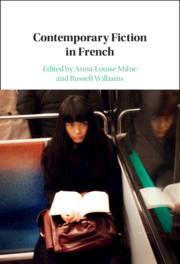Book contents
- Contemporary Fiction in French
- Contemporary Fiction in French
- Copyright page
- Contents
- Figures
- Notes on Contributors
- Introduction
- Chapter 1 Mediterranean Francophone Writing
- Chapter 2 After the Experiment
- Chapter 3 Getting a Future
- Chapter 4 Contemporary French Fiction and the World
- Chapter 5 The Franco-American Novel
- Chapter 6 Graphic Novel Revolution(s)
- Chapter 7 ‘Back in the USSR’
- Chapter 8 Fictions of Self
- Chapter 9 Trauma, Transmission, Repression
- Chapter 10 Wretched of the Sea
- Chapter 11 Urban Dystopias
- Chapter 12 Imagining Civil War in the Contemporary French Novel
- Notes
- Select Secondary Bibliography
- Index
Chapter 4 - Contemporary French Fiction and the World
Transnationalism, Translingualism and the Limits of Genre
Published online by Cambridge University Press: 30 March 2021
- Contemporary Fiction in French
- Contemporary Fiction in French
- Copyright page
- Contents
- Figures
- Notes on Contributors
- Introduction
- Chapter 1 Mediterranean Francophone Writing
- Chapter 2 After the Experiment
- Chapter 3 Getting a Future
- Chapter 4 Contemporary French Fiction and the World
- Chapter 5 The Franco-American Novel
- Chapter 6 Graphic Novel Revolution(s)
- Chapter 7 ‘Back in the USSR’
- Chapter 8 Fictions of Self
- Chapter 9 Trauma, Transmission, Repression
- Chapter 10 Wretched of the Sea
- Chapter 11 Urban Dystopias
- Chapter 12 Imagining Civil War in the Contemporary French Novel
- Notes
- Select Secondary Bibliography
- Index
Summary
From a twenty-first-century perspective, reading the 1992 livre-manifeste produced by authors linked to the Pour une littérature voyageuse movement is a reminder of how far and how rapidly French literary culture has evolved since the turn of the millennium. Not strictly a manifesto, the volume draws together essays by writers in the group around Michel Le Bris, who were involved in establishing with him the ‘Étonnants voyageurs’ festival in Saint-Malo in 1990, and in setting up simultaneously the journal Gulliver. Le Bris was a key figure in later twentieth-century literature and thought, progressively reinventing himself as the editor, post-1968, of La Cause du Peuple (for which, with the authorities too timorous to arrest Sartre, he was briefly imprisoned), as the structuralist author (under the pseudonym Pierre Cressant) of a 1970 biography of Claude Lévi-Strauss, and – the author of L’Homme aux semelles de vent (1977) – as a nouveau philosophe or ‘new philosopher’. Under Le Bris’s steer, the Pour une littérature voyageuse authors responded to various crises – literary and political – in fin-de-siècle France, in order to posit a neo-realist form of writing that claimed to respond, somewhat belatedly, to the impact of the nouveau roman and its theoretical manifestation, Structuralism. Le Bris himself championed ‘une littérature qui dise le monde’ / ‘a literature which says the world’, a reaction to what he saw as the ‘mise-en-parenthèses du monde’ / ‘bracketing-off of the world’ that he discerned in the work of writers such as his fellow Breton, Alain Robbe-Grillet. Although those signing up to this project worked across a range of genres, including poetry (in the work, for instance, of the translingual writer of Scottish origin, Kenneth White) and the essay (notably Jacques Meunier), many of them – including Le Bris himself – were novelists with an interest in the intersection of fiction with travel writing. As such, they may be seen as part of two major literary developments in the Mitterrand years: the emergence of an often post-generic ‘prose’, in which fiction, autobiography and other forms of documentary writing merged; and the reassertion of the narrative as a vehicle for storytelling, in what some critics have dubbed the ‘return to the story’.
- Type
- Chapter
- Information
- Contemporary Fiction in French , pp. 72 - 89Publisher: Cambridge University PressPrint publication year: 2021



